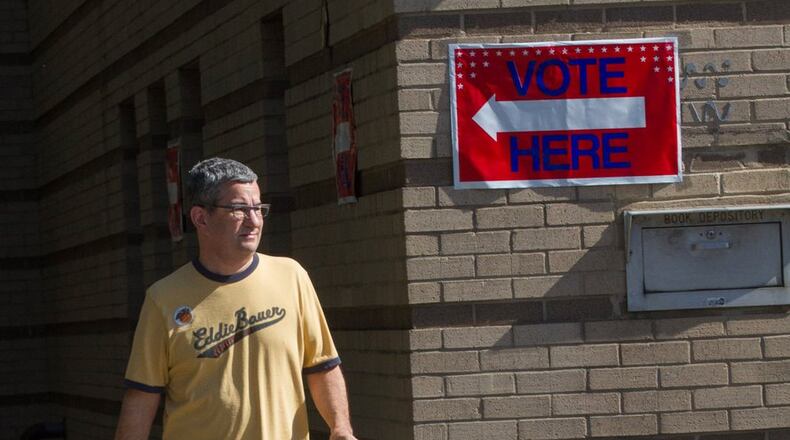Atlanta mayoral candidate Peter Aman recently called a press conference to announce endorsements from four prominent women. He followed up a few days later with a television ad in which his wife, Lisa, does most of the talking. Then he announced another wave of endorsements flanked by 20 more women.
Analysts suggest that turnout in Tuesday’s vote to succeed Atlanta Mayor Kasim Reed could be abysmally low. That means a seldom-mentioned sliver of the electorate - committed voters, the majority of whom are women - could play a significant role in electing the new mayor.
“We know them by name and by address,” said Aman.
This Election Day will be a volatile one. The top contenders have raised more than $10 million, more than any election in recent memory, but that money has failed to inspire voters. And Atlanta’s quirky demographics, a crowded field of candidates and voter apathy have created an unpredictable contest with each campaign identifying a unique path to victory.
For some the path is clearer than others. The two apparent front-runners, City Councilwomen Mary Norwood and Keisha Lance Bottoms, might only have to ensure their core base of supporters show up at the polls.
Everyone else will have to snatch up a significant portion of the undecideds, who could make up as much as one-sixth of the electorate.
For Aman, a former Atlanta chief operating officer, building more support among women is key. Former state Sen. Vincent Fort is targeting young progressives and union workers. Cathy Woolard hopes that her backers in East Atlanta will tip the contest in her favor.
They are knocking on doors and sending teams of canvassers to neighborhoods they’ve visited once or twice before. They are launching new rounds of robo-calls and targeted mail pieces imploring their supporters to cast their ballots. And they are telling potential voters they still have a chance, never mind the rumors and, in some cases, the polls.
“It’s really hard for campaigns and candidates to gauge this because we haven’t had a really competitive mayor’s race since 2009, and our city has changed dramatically since then,” said Mark Rountree, a pollster with Landmark Communications. “And many of those voters are new, and don’t have relationships with the candidates.”
An Atlanta Journal-Constitution analysis shows that about 12 percent of Atlanta’s roughly 250,000 registered voters have cast ballots in five or more elections over the past four years. About 58 percent of those super-voters are women, and black females - the largest demographic bloc - comprise 33 percent of the group.
Sweeping change
The AJC analysis also showed the city’s voting age population has dramatically changed since the 1980s and early 1990s, when black population peaked at 62 percent. These days, Atlanta voting-age population hovers around 49 percent black and 44 percent white, fueling the sentiment that Atlanta could elect its first white mayor since 1973.
Yet more African-American voters have joined the rolls since the last mayoral election four years ago. About 53 percent of the 102,276 people who registered to vote and identified their race since 2013 are black and 44 percent are white. The remainder are Hispanic.
And in fast-changing neighborhoods such as Midtown and the Old Fourth Ward, demographic trends are even starker.
The number of new white voters since 2013 in those areas has outpaced African American registrations by a three-to-one ratio. At the same time, neighborhoods in south and west Atlanta have added more than 27,000 African Americans to the voter rolls, but only 1,724 white ones.
The five leading black candidates are homing in on areas with high African-American turnout, while the three top white contenders are trying to shore up support in Buckhead and east Atlanta.
Targeted push
About 20,000 Atlanta voters have cast early ballots, and the early vote is typically between 40 percent and 60 percent of the total. In 2009 contest, Reed made the runoff with about 26,000 votes; in this more crowded field, some campaigns predict as few as 15,000 votes could earn them a spot in the December runoff.
Former City Council President Cathy Woolard is hoping to maximize turnout in her east Atlanta base with a bevy of meet-and-greets and trips to voters’ doorsteps; she was waving to supporters at a busy street corner off Ponce de Leon Avenue the other day.
“We know who our voters are, we’ve got them voting early,” Woolard said, “and we’ll turn out the remainder on Election Day.”
Ditto for Aman, who is furiously trying to build his support by leveraging endorsements from high-profile women in the community. He has also invoked the name of former Atlanta Mayor Shirley Franklin at events, though she has said she won’t endorse anyone in this round.
Bottoms, the lone African-American women in the race, is staying on the offensive: Her latest advertisement depicts Norwood, a self-described independent, as a closet Republican. And she’s touting the endorsements of hip-hop artists Ludacris and T.I. ahead of plans visit black churches today.
The city’s historically black neighborhoods are teeming with other campaign events.
Council President Ceasar Mitchell planned a virtual town hall and march with women in southwest Atlanta. Former Fulton Commission chair John Eaves aims to leverage his endorsement from Rev. Jasper Williams Jr., a prominent black preachers. Councilman Kwanza Hall dispatched more than 100 volunteers, many of whom will crisscross the footprint of his intown Atlanta district.
And Fort is hinging his campaign on the enthusiasm of white liberals and working-class blacks who are energized by his populist promises. At a pre-dawn campaign stop at the West End MARTA station last week, Fort handed out campaign swag to commuters on their way to work with a promise he was the right candidate for the “little people.”
Deedy McCaskill, a MARTA operator, was loaded up with Fort buttons by some of her colleagues as she rushed to work. By the time she reached the candidate, she admitted, she wasn’t sure if she wanted to keep wearing his paraphernalia.
“I am wearing all this stuff,” she said. “I want to hear what you have to say first.”
“I’ll tell you this,” Fort said. “I was with you before it was cool.”
Bryan Williams, a cook at a nearby Checker’s fast-food chain, told Fort he wanted something done about corporate rules prohibiting convicted felons from holding management positions.
“A mayor can influence,” Fort said. “We may need to sit down with the business community and say, ‘You need to ban the box.’”
As he walked way, Williams said he still hadn’t made up his mind.
Election Day
Tuesday, Nov. 7
Polls are open from 7 a.m. until 7 p.m. on Election Day, except in the City of Atlanta where the polls will close at 8 p.m.
Any voter who is waiting in line to vote at 7 p.m. (8 p.m. in Atlanta) will be allowed to vote. Peak voting hours are historically from 7 a.m. until 9:30 a.m., 4:30 p.m. until 7 p.m., and during the lunch hour.
To be eligible to vote in Georgia you must be:
- A citizen of the United States
- A legal resident of Georgia and of the county in which you wish to vote
- At least 17.5 years old to register, and 18 years old to vote
- Not serving any sentence imposed by the conviction of a felony
- Not judicially determined to be mentally incompetent
- Vote411.org
Keep Reading
The Latest
Featured






